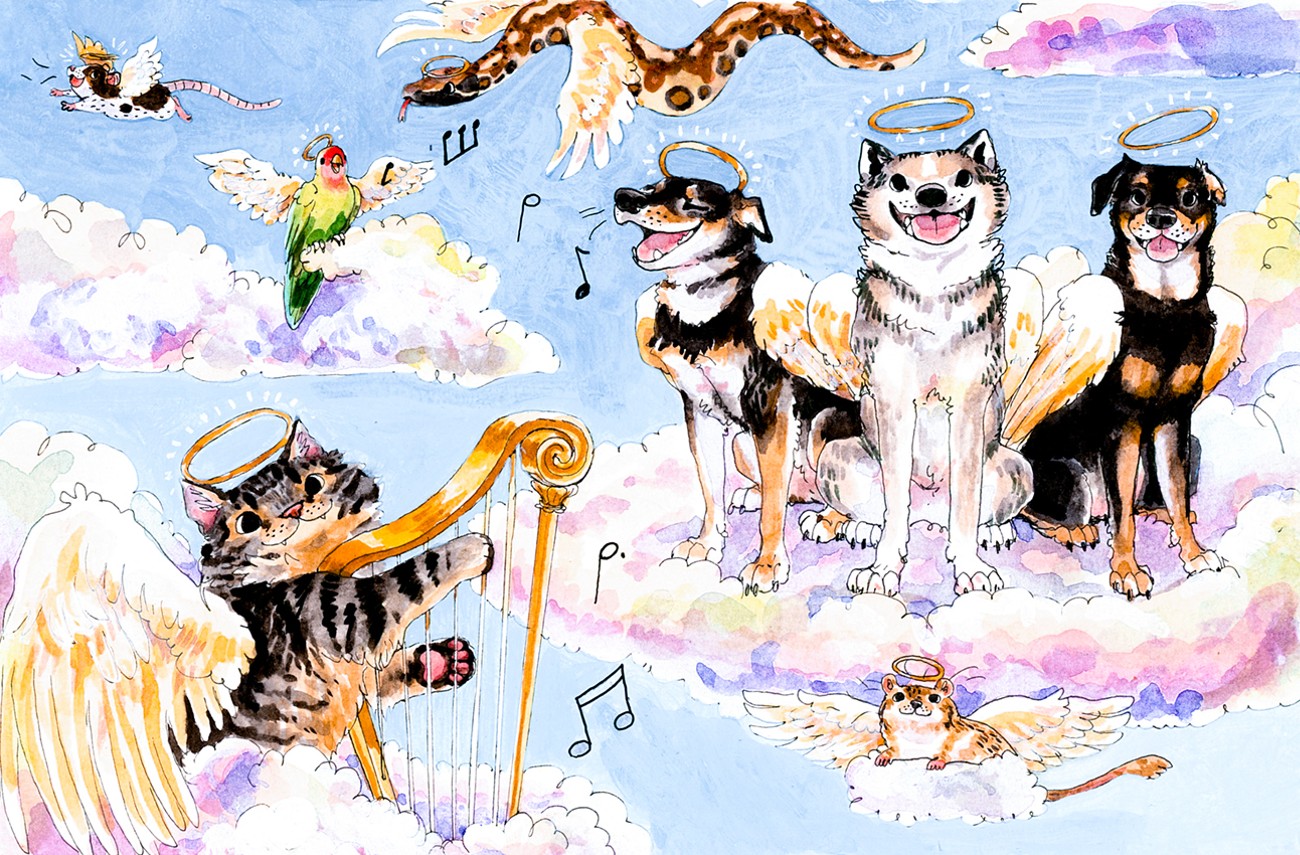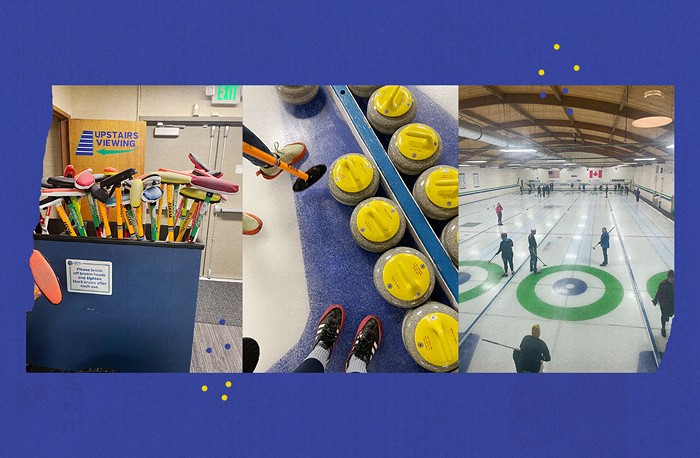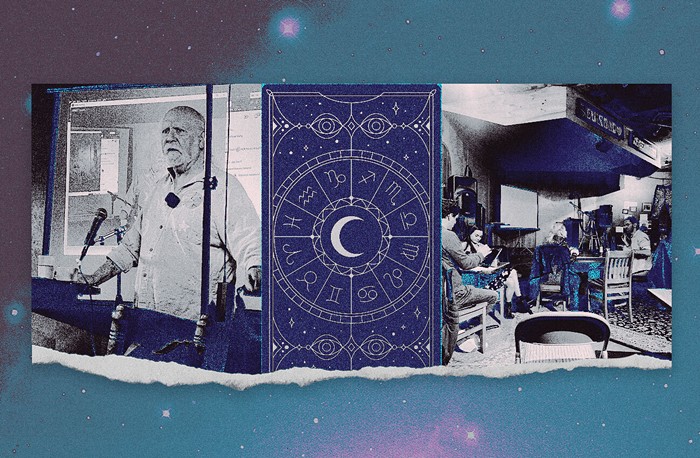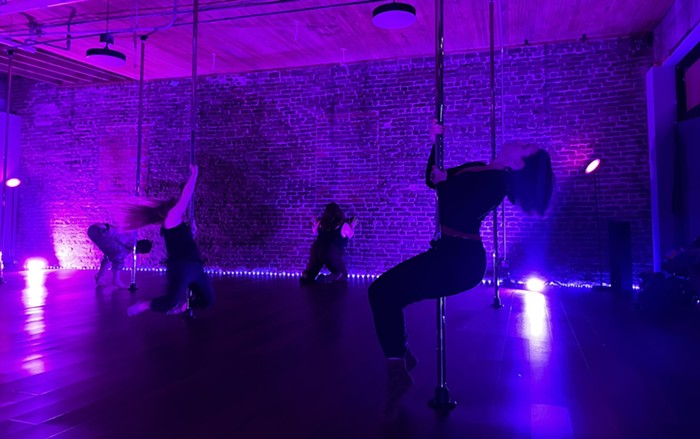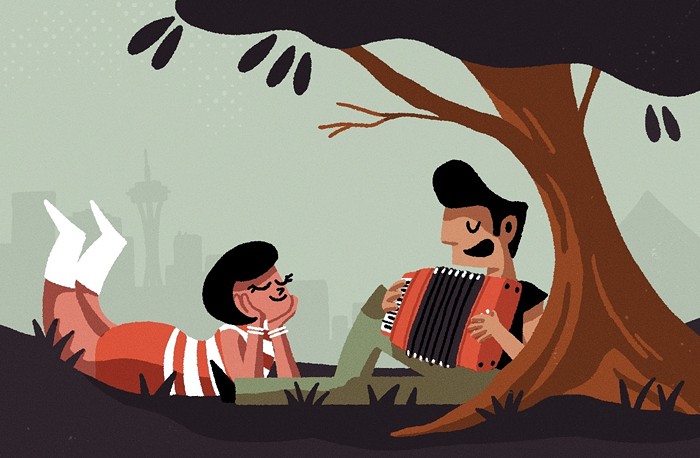When 5:30 pm rolled around last Thursday, I hopped on my computer and joined a video call. Six other women were there. One had a big, long-haired tabby cat as her background. Another clutched a stuffed animal of a dog. A wall-mounted cat tree seemingly bloomed out of a different woman’s head; a cat bathed itself on the branch sprouting above her ear. Welcome to Seattle Animal Shelter's Pet Loss Support Group.
Cindy R., a 59-year-old feline behaviorist, spoke about her tragic year. In the last nine months, she lost four cats (Romeo, Kieran, Hoya, Alex), a senior raccoon she nursed back to health who would visit her home (Sally), a guinea pig (Oliver), and her own mom, Gigi. She’s been going to this group ever since.
One of her cats, Romeo, was the world’s first skateboarding cat. Even though he and his brother, Kieran, both lived until they were 17, she felt like she “had been robbed.”
“I want more time,” Cindy said.
Jasmin, a first-time attendee whose name I’ve changed for anonymity, came in because she lost her cat, MeowMeow, back in March. MeowMeow wasn’t dead, however. Jasmin lost MeowMeow, a four-year-old Siberian, in a breakup. Her partner moved to China and took the cat with them.
“Getting over the relationship was easy compared to losing the cat,” Jasmin said. She doesn’t know what to do with the pain. Every time she finds a cat toy under her couch, it hurts all over again.
“If I had the financial resources to send mercenaries to China to retrieve my cat,” Jasmin said, “I’d have her right now.”
“They worm their way into our hearts, don’t they?” Connie Starr, the founder of SAS’s Pet Loss Support Group, said.
Starr, a middle-aged woman with a purple tint to her hair, facilitated the conversation. She founded the group in 2006. After a few empty meetings, the group caught on—spreading through word of mouth and finding members via vet recommendations when people’s pets kicked the bucket. They met every Thursday at the animal shelter until the pandemic sent it online.
I first discovered pet loss support back when I reported on City Hall. Every Monday, I’d check the city calendar. Without fail, Thursdays showed a standing pet loss support group meeting. Something about it fascinated me—who was so torn up about their pet’s death that they’d go to a support group? Was the demand so high it necessitated weekly meetings?
Now, with the excuse of exploring Seattle’s subcultures and communities in this column, I finally dove into the world of pet loss. In doing so, I met a series of odd yet tender-hearted people, and I contemplated my own relationship with pets—the ones in my life now and the ones long gone from childhood.
I gave Connie Starr a call.
Connie and the Dog Pack
The majority of last week’s attendees have been to every meeting for months to deal with their pets’ deaths. To many people, especially in Seattle (the nation’s cat dad capital and a place where the number of dogs outpaces the number of children), a pet death can feel just as painful, if not more painful, than a family member's death, Starr explained to me over the phone, breathing hard. She was on a walk with her dogs.
“In some ways we have tipped over to anthropomorphizing pets,” Starr said, dirt crunching under her feet on the other end of the call, “So many people who are so attached to their pet come in and say, ‘Why do I feel this way? I didn’t feel like this when my mom died.’”
Starr’s explanation is simple: Pets give a type of unconditional love that human relationships can’t match. On top of that, pet owners are responsible for a pet’s entire world—their entertainment, their food, their medicine.
Starr first learned about these types of groups when two of her dogs—both huskies—died within a short period from cancer back in the 1990s. Ruby died first at only four-and-a-half years old. Her older husky, Tasha—-“everyone names their first husky Tasha,” Starr said, “or Yukon,” she added—went next.
Grief-stricken, Starr sought out pet loss groups. She attended one at the Eastgate Humane Society in Bellevue, finding solace in the community. People understood her loss. These weren’t just dogs she lost, these were members of her family. She couldn’t get over it with a new puppy as everyone seemed to suggest.
Being able to talk about her loss and to keep talking about her pets was helpful. She’d been a long-time volunteer at SAS, leading the dog-walkers and helping out with pet therapy. For her masters thesis in counseling at Seattle City University, Starr approached SAS to start up the pet loss support group.
“Jake!” She shouted in the middle of talking to me. “Buttercup! C’mon guys!”
To me, she muttered, “Ugh, squirrels.”
She picked up the conversation as if nothing happened.
“People can dig themselves out of this well of grief to support someone else who is in that same well,” Starr said. “It’s really amazing to see, very up lifting.”
Starr has eight dogs, all Siberian or Alaskan huskies. Four of them are “foster failures,” attempts at fostering dogs that ended up with Starr adopting them herself. They’re literally a sled dog team. She lives in Cle Elum now. She told her dogs she’d retire to the country, and she kept her word. (“It should be illegal to have this much fun,” she said.) But five of her dogs are over 12 years old.
“I’m going to be well in that well of grief for a long time,” she said.
One of the most crucial things the group provides is a place for people to talk about their pets.
“People really need to come and tell their stories and be listened to because they’re not getting that anywhere else,” Starr said.
Stories that hit too close to home (for Starr, that's anything to do with huskies), or particularly tragic stories such as pets who died in house fires or who were run over by the owners’ dads (real examples from Starr), can weigh on the facilitators. Due to burnout, Starr doesn’t have enough facilitators to host weekly meetings anymore. The group started meeting only twice a month in April.
Anyone who has empathy and who’s been through the gauntlet that is pet death can be a facilitator, Starr said. Someone like Bruce.
Bruce and Richie
Bruce Friend, 65, a naturopath in Spokane Valley, found the support group when he lived in Fremont. He called the crisis line in 2007 after his cat, Richie, died.
Friend inherited Richie from his then-girlfriend. He’d moved in with her and Richie in ‘94 after he’d suffered a stroke.
“That type of injury makes you feel isolated,” Friend said. “Having Richie’s friendship and knowing he was there really filled a huge void.”
After he and his girlfriend became estranged, Friend kept Richie. They had an incomparable camaraderie. When Richie died, the grief felt different from the aunts, uncles, and grandparents Friend had lost in the past—he couldn’t throw it.
“It was like having a big, wet beach towel thrown up over your head and shoulders all the time,” he said.
The operator suggested the support group. So, Friend went. And he kept coming back. He learned to process grief better, and he was so moved by the community he started facilitating discussions.
“He was so good because his story was so good,” Starr said. “People could see themselves in his story and his recovery.”
He never owned another cat after Richie. He thinks it would be too painful.
Starr told me the group persuaded Friend to finally get another pet. He chose a gerbil named Priscilla. (Friend tells the story differently and says he inherited Priscilla when a girlfriend “went to Ireland.”)
“The shelf life of gerbils is not long,” Starr said. Before long, Friend leaned on the group to get through Priscilla’s death. “We told him he should’ve gotten a parrot or a tortoise,” Starr said.
One of the things that struck Friend was how the group accepted his emotions. In his social life, he felt afraid even getting teary eyed—let alone feeling so devastated—by the death of a cat or a gerbil. Throughout his years in the group, the majority of attendees were women, but men would show up, too.
“These big macho guys would come in and be destroyed because their dog had passed away,” Friend said. “Some of the most touching stories came from the men. In hindsight, it’s because I could relate more to them.”
He heard beautiful stories about love in his years with the group.
“If I’d been John Lennon or something I could’ve written a song,” he said.
Alexis, Sherlock, and Missy
Alexis Burroughs, 59, a yoga and meditation teacher living in Bothell, lost her two dogs, Sherlock and Missy (aka Miss Marple) six months apart from one other last year. She still carries their vet cards in her wallet. Both ailing senior dogs, she took them to a holistic vet specializing in palliative and hospice care. For months they received acupuncture, Chinese herbs, and laser therapy.
“They were my kids with four legs,” Burroughs said in a UK accent warped by 30 years in the U.S. “And it was funny because my son would always say, ‘I want a brother,’ and I would say, ‘Sherlock is the nearest you’re going to get to a brother.’”
For almost a year, Burroughs attended the pet loss support group. Not only did she miss her dogs, but she felt adrift without their routines. Even walking around her neighborhood hurt because that’s where she walked with them.
At the suggestion of the group, she started taking walks in the opposite direction. “It was okay,” she said, “but I just didn’t feel it.” What really worked was when she started going to a wooded area and meditating a bit to summon the presence of her dogs, she said. (Burroughs is also a forest therapy guide). When she sees two squirrels or two hummingbirds chasing each other, she sees Missy and Sherlock.
The end-of-life process for her dogs and the support she gained from the group moved her so much that she became a licensed pet chaplain. From her explanations, pet chaplaincy sounds sort of like a death doula for pets, or someone to help guide you through the death process.
Missy and Sherlock died in their backyards in an at-home euthanization.
“All I can say is, please be in there with your animal at the end,” Burroughs said. “Because they look for you.”
Group Therapy
Burroughs’s words stuck with me. I thought about the way she helped escort Sherlock across the “Rainbow Bridge,” as pet loss people call pet afterlife. When it was my turn to share during the meeting last week, I talked about how my family's dog, Copper, died four years ago. He had an emergency at a kennel while the family was in Yosemite. The kennel workers brought him to the vet. The prognosis was about as bad as it could’ve been. We chose to end his suffering instead of driving six hours to be with him.
I admittedly do not think much about his death, but conjuring up the memory stirred a shred of guilt in me. His death was the opposite of Sherlock's and Missy's.
“He doesn’t think about death the way we do,” Starr said sympathetically after I shared. Starr’s words soothed a scarred wound.
Despite sharing a pet loss story, I didn’t think I’d adequately participated in this the way I do in other “Play Date” columns. And how could I? Losing a pet from childhood isn’t the same as losing one you care for every day, one who is your whole world. The cat I have now, Cricket, is that for me. Thankfully, he is very much not dead.
No matter what I tried, I would be an outsider looking into this world. Hopefully for a long time to come.
But I found a point of connection I didn’t expect during these interviews. People kept bringing up their moms.
Socorro “Suky” Duen, 42, lost her cat, Kitty-Meow, in January. Kitty-Meow belonged to her mom. When her mom died, Duen inherited Kitty-Meow, who she described as “a big chunky monkey of a boy.” She had her own theme song for him, which she declined to sing for me.
“The reason Kitty-Meow’s passing has hit me so numbly is because he was a connection to my mom,” Duen said. “All I had left of her besides her memory was Kitty-Meow.”
Duen’s mom had all types of animals growing up and really “instilled in her the animal-lover mentality,” she said.
Burroughs said her mom loved animals more than people.
My mom (who is still alive) is this person for me. She rescued baby squirrels and fledgling crows, nursing them back to health with syringes of baby formula and spoonfuls of scrambled eggs. The way I talk to my cat is the way my mom talked to our cats growing up. I think about my mom every time I feed Cricket, whistling the same tune she did for all our animals.
To nurture is to love. No matter who or what is on the other end of the affection, it matters. The only downside to nurturing and loving a pet is the limited time we have with them.
“Their life spans are shorter than ours,” Starr said. “But, if we died, then who would take care of them? In some ways this is better.”
Maybe everyone could just live forever, Starr posed.
"Well, then I'd have a hundred dogs," she said.
Any ideas on which Seattle subculture I should explore next? Want me to tag along with you on your favorite hobby or pastime? Send me tips at playdate@thestranger.com.
